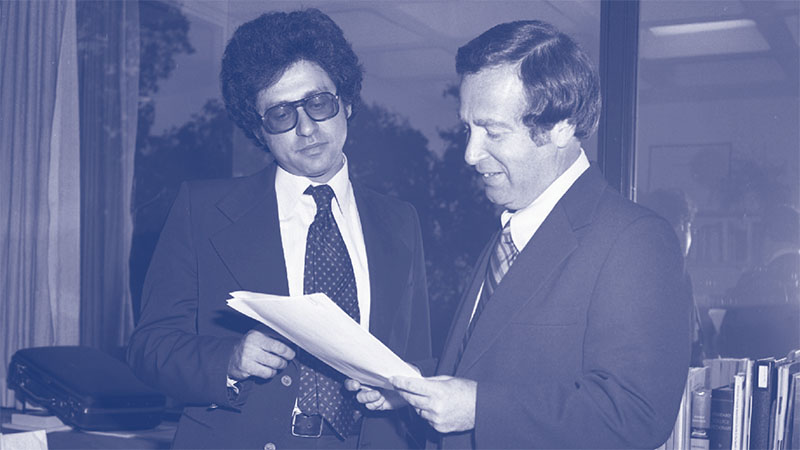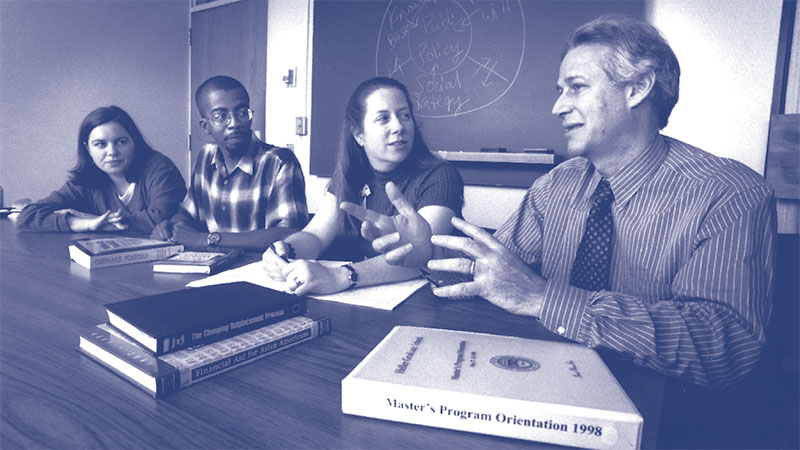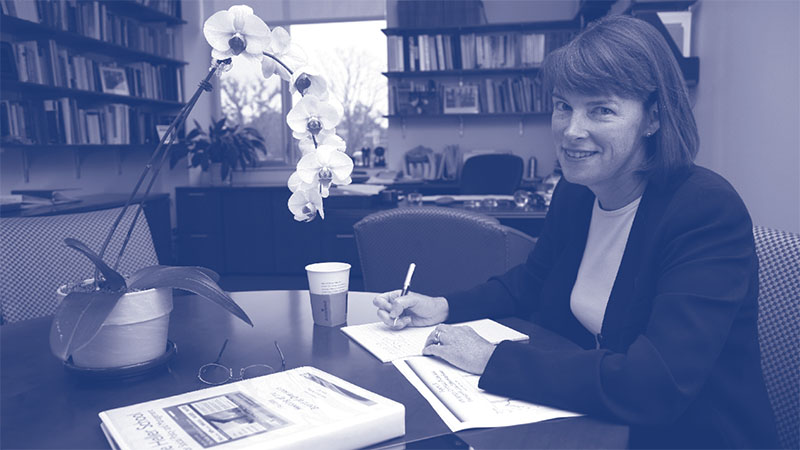
Stuart Altman
Sol C. Chaikin Professor of National Health Policy
Heller School Dean, 1977-90, 1992-93, 2005-08
When I was selected to be dean in 1977, the Heller School was in a serious situation. Much of the federal funding it received during the Great Society period was being eliminated, and many of the original faculty that had created the school had decided to retire. I was faced with a double-barreled set of problems: how to maintain a financial base for the school, and how to attract new researchers and faculty members. I am quite proud that we met those challenges.
During my tenure as dean, we expanded Heller’s research on disability policy and on children and families. We also built a major research institute in health care policy and started a new academic program: the Master’s in Management of Human Services (MMHS), now called the Social Impact MBA program. I helped create the Schneider Institutes for Health Policy so that my research could blend with that of others here at the school, and so the school could receive funding that supported researchers and students who were interested in health policy research. I think Heller came out of that period a stronger, more respected school, and today remains a leader in social policy research and education.
One area that has changed considerably is the relationship between the Heller School and the rest of Brandeis University. When Heller was formed, it was a unique, separate entity that really only trained PhD students. Its faculty had little or no relationship with the rest of the university. Today, we’re much more integrated with the university than we were when the school first started, and much of that happened during my tenure. But that relationship was also expanded by deans who took my place, and I give them a lot of credit for what they did.
The problems the school focused on in the 1960s are still problems today, and I think that says something about our society. What has changed at the Heller School is that we’re now a major force in the international area as well as the domestic, for example, in sustainable international development and global health policy. The problems that we focus on really are not new. Although some of the techniques are different in terms of how you deal with them, the problems are the same.

Jack P. Shonkoff
Julius B. Richmond FAMRI Professor of Child Health and Development, Harvard T.H. Chan School of Public Health and Harvard Graduate School of Education
Professor of Pediatrics, Harvard Medical School and Boston Children’s Hospital
Director, Center on the Developing Child at Harvard University
Heller School Dean, 1994-2005
My years as dean of the Heller School were a time of deep personal and professional growth. My learning curve was steep, and the relationships I developed were rich.
Heller’s public face changed in several ways during that period. We coined the tag line “Knowledge Advancing Social Justice,” and changed our name from the Florence Heller Graduate School for Advanced Studies in Social Welfare to the Heller School for Social Policy and Management. We hired Bob Reich and Anita Hill, which increased our public visibility, and we rose to the No. 3 position in the U.S. News & World Report ranking of graduate schools of social policy.
During my tenure, we strengthened our signature PhD program and made significant changes in our master’s footprint. We converted our sole degree offering of a Master’s in Management of Human Services (MMHS) to an MBA, and added an MA in Sustainable International Development and an MS in International Health Policy and Management. This expansion in master’s-level education diversified the student body dramatically and generated a stronger revenue base for the school. We also created a new undergraduate major in Health: Science, Society and Policy (HSSP).
Perhaps the most “concrete” (pun intended) achievement associated with my time as dean was the completion of a successful fundraising campaign to construct the Irving Schneider and Family Building and renovate the existing facilities. The barriers we faced at that time were formidable, and there is no way we could have overcome them without the leadership of Tom Glynn, MSW’72, PhD’77, and Ronny Zinner, chair and vice chair of the Heller Board, and Sen. Ted Kennedy, who helped secure the federal funding that catalyzed the private philanthropy that made this “impossible dream” a reality.
Where does the school go next? Academic social policy, broadly speaking, must begin to confront the harsh reality that although progress has been made in reducing structural inequities and improving human well-being over the past 60 years, there is still so much more work that needs to be done. The challenge for a place like Heller is to move beyond advocacy for policies and programs that work, and to raise the bar by considering current best practices as a starting point, not a destination. The struggle for social justice desperately needs fresh thinking and more effective strategies to achieve larger impact at scale. We must create safe spaces where constructive dissatisfaction with what we’ve achieved to date is viewed as empowering; risk-taking is nurtured; and learning from failure is seen as more valuable than meeting predefined deliverables. The Heller School can and should be such a place.

Lisa M. Lynch
Provost, Executive Vice President of Academic Affairs, Maurice B. Hexter Professor of Social and Economic Policy
Heller School Dean, 2008-14
When I started as dean at Heller in 2008, we were in the midst of the greatest financial crisis since the Great Depression. Across the country, there was major economic displacement and economic hardship, and all universities, including Brandeis, faced severe financial challenges.
Paradoxically, at Heller, it was a period of tremendous growth and excitement. We had upgraded and doubled our physical space with the addition of the Irving Schneider and Family Building and the renovation of the existing Heller-Brown Building. This gave us beautiful new classrooms, state-of-the-art technology and new common spaces. Our expanded space allowed for a rapid growth of our graduate programs as more and more students decided to get a master’s degree during the recession. With all of our research centers and institutes finally united into one contiguous space, we focused on creating more permeable boundaries across the degree programs and research centers and institutes.
It was also clear that there was growing demand from our students to cross traditional degree boundaries. Therefore, we developed a range of new dual and joint degree programs within Heller, with other departments across the university and with other universities. Examples included bringing the Conflict Resolution and Coexistence (COEX) program into Heller, establishing new dual master’s degrees such as the MPP/MBA and Sustainable International Development/COEX, expanding dual MBA or MPP degree options with the Hornstein Jewish Professional Leadership program, and building dual degree programs with Tufts Medical School (MD/MBA, and Master of Biomedical Sciences/MBA).
Given Heller’s commitment to “knowledge advancing social justice,” we undertook a major strategic planning effort in 2011 and concluded that we needed to make better anti-discrimination efforts at Heller. We developed a detailed plan for engagement and work across a wide range of areas of the school: faculty appointments, student selection, research and curriculum. While we made progress, the student demonstrations of 2015 and beyond have shown that there is still more that needs to be done in this important area.
As the current SARS-CoV-2 pandemic has shown us, the need for knowledge about social policy has never been greater. For me, the “special sauce” of Heller is that among the community, there is always a sense of hope and possibility informed by rigorous analysis, even in the darkest moments.
